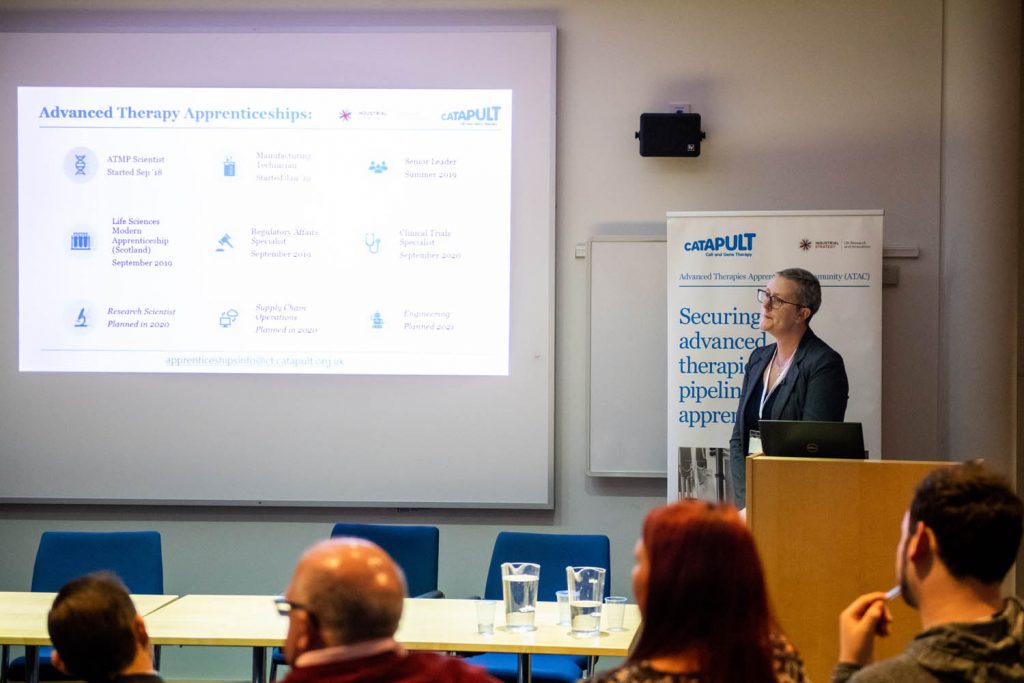Dr Kate Barclay is an Independent Consultant working across high impact Science & Technology industries with a passion for STEM education. At the recent event in National Apprenticeship Week, she discussed some of the common myths around apprenticeships. For more highlights of the day watch this video.
24 April 2019
All businesses pay the Apprenticeship Levy – FICTION
The Apprenticeship Levy is 0.5% of your annual payroll over £3m, so not all businesses pay it. To find out how much you pay, access the government gateway. The levy is taken by HMRC and placed in a digital account. The money in this account can be used to pay for apprenticeship training and assessment and a certain amount can also be transferred to companies in your supply chain.
Apprenticeships are only for 16 to 19-year-olds – FICTION
There is still a misplaced understanding that apprenticeships are only for 16 to 19 year olds, however apprenticeships are for everybody. In Scotland, the funding is different depending on the age of the apprentice, however anyone can still apply. In England the funding is based on the apprenticeship standard, not age, and there is no salary limit. There is a minimum salary, but we would recommend a benchmarking exercise before making salary decisions.
You can use your Apprenticeship Levy to upskill your existing workforce – FACT
You can use your Levy to upskill your existing workforce. Within the first Level 3 Science Manufacturing Technician apprenticeship cohort, 50% were existing staff within their organisations. These organisations wanted to upskill those individuals to give them the level of knowledge, skills and behaviors at Level 3 to be a fully competent Science Manufacturing Technician.
The Senior Leader degree apprenticeship will require a minimum of three years’ management experience. It is aimed at existing staff who are looking to move into senior leadership roles.
The Regulatory Affairs Specialist apprenticeship in Advanced Therapies is aimed at both new graduates, but also existing staff within organisations who are qualified within a scientific discipline but wish to progress into regulatory affairs.
Apprenticeships are for those who didn’t make the grade – FICTION
On many higher and degree apprenticeship programmes the academic qualifications needed to become an apprentice are equivalent to those needed to go to university. In many ways, more is expected of an apprentice because they have to manage work and study which requires a lot of dedication.
The Level 5 Advanced Therapies Scientist apprenticeship contains a foundation qualification which requires a total of over 80 UCAS points with a minimum B at A Level Biology or equivalent. The Clinical Trials Specialist apprenticeship is a Degree qualification, so apprentices will need to have the equivalent number of UCAS points as if they were applying for university. To apply for the Regulatory Affairs Specialist, you need to already be educated to degree level.
20% off-the-job training makes it impossible for development of existing staff – FICTION
20% off-the-job training is an essential part of an apprenticeship. It is what develops a person to the next level, giving them time in the workplace to develop their knowledge, skills and behaviors.
There’s an awful lot that constitutes off-the-job training, particularly in the cell and gene therapy field that includes technical qualifications or technical certificates. What doesn’t count is the day job, whether it’s in manufacturing, start-up and operation, work safety, understanding regulatory requirements, resolving problems, that is on-the-job training.
